Introduction
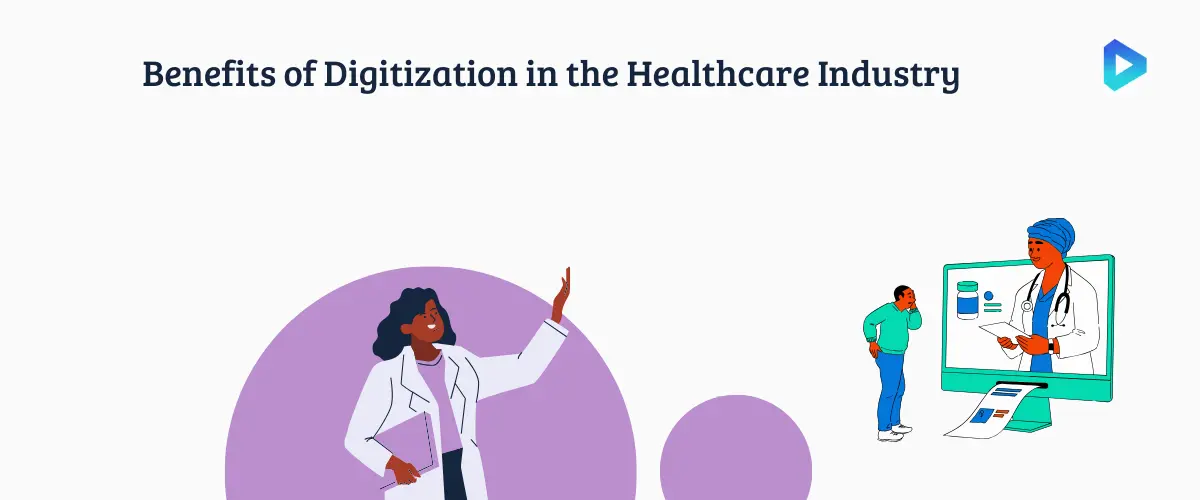
Digitizing pharmaceutical data is a crucial process in the pharmaceutical industry that involves converting conventional paper-based records into digital formats. The important change involves using electronic methods to capture, store, and manage various information related to drugs, medications, patients, clinical trials, research findings, and more.
- Definition of digitizing pharmaceutical data
- Importance of digitization in the healthcare industry
1. Definition of digitizing pharmaceutical data
One important aspect of this digital transformation is converting prescription and patient records from handwritten or printed documents to digital files. By converting records to digital files, healthcare professionals can easily access and update patient information. This leads to streamlined workflows and, ultimately, improved patient care.
2. Importance of digitization in the healthcare industry:
Digitization has transformed healthcare and changed the way medical services are delivered and used. This transformation has brought numerous benefits for both patients and healthcare providers. One significant advantage is the seamless exchange of health information among various stakeholders, like hospitals, clinics, laboratories, and pharmacies. This simplifies administrative tasks and ensures accurate and prompt patient data, ultimately improving diagnosis and treatment choices.
Enhanced Accessibility and Interoperability
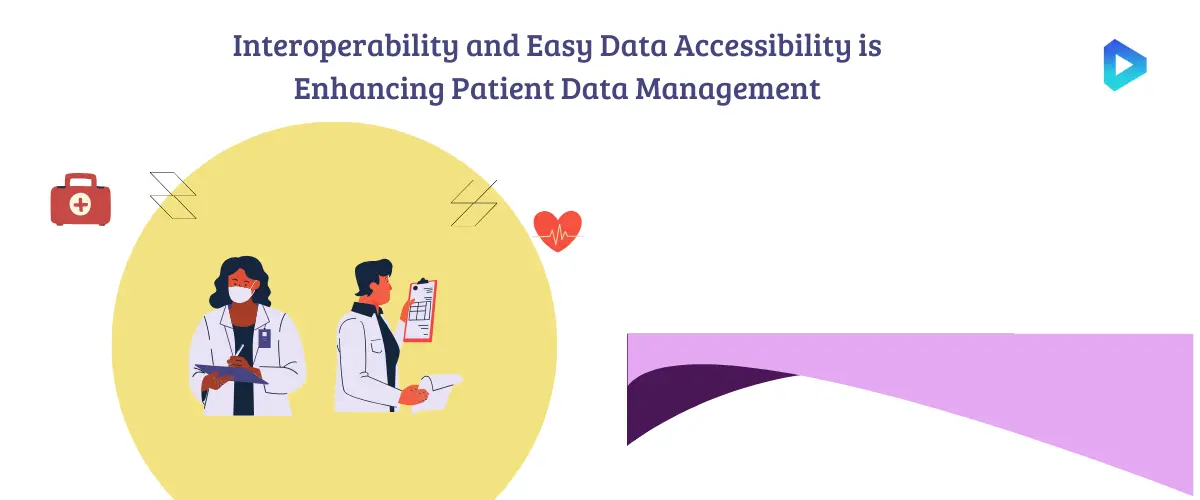
- Easy access to critical patient information
- Reduction of medical errors and improved patient safety
- Interoperability and seamless collaboration
1. Easy access to critical patient information:
Digitalization allows healthcare companies to access patient information electronically, using Electronic Health Records (EHRs) and Health Information Exchange (HIE) systems. Healthcare professionals can easily access crucial patient information, including medical history, diagnoses, medications, allergies, and test results. This comprehensive view helps them better understand and treat patients.
2. Reduction of medical errors and improved patient safety:
Digitizing health data can minimize medical errors due to illegible handwriting, misplaced records, or missing information. Accurate and up-to-date records help identify potential drug interactions, allergies, and patient-specific needs. This improves patient safety and reduces adverse events.
3. Interoperability and seamless collaboration:
Digitized data promotes interoperability between healthcare systems, helping to secure the sharing of patient information among different healthcare providers. This seamless collaboration fosters coordinated care, reduces redundant tests, and ensures consistent treatment plans, ultimately improving patient outcomes.
Real-Time Data Analytics
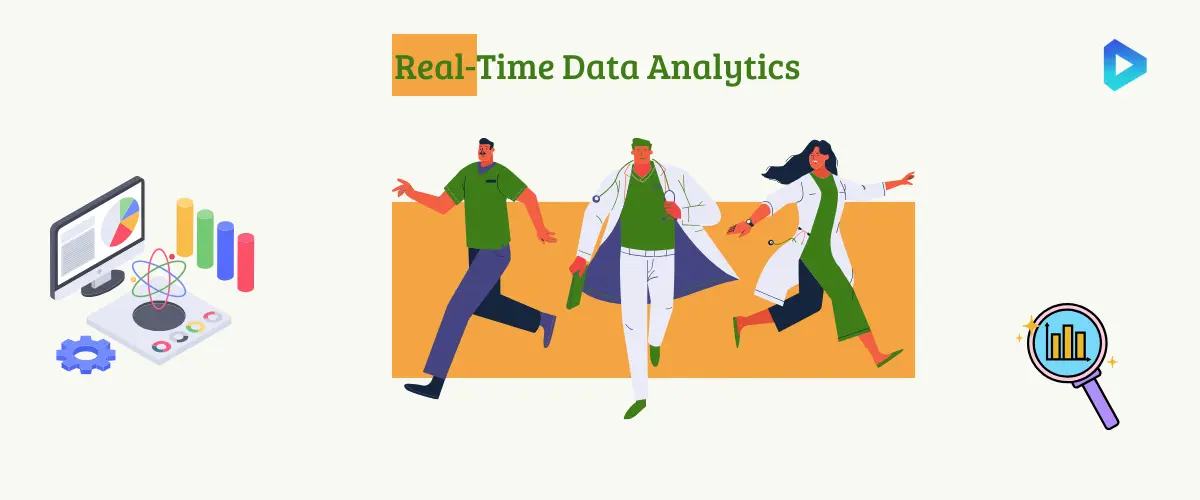
- Leveraging advanced analytics for evidence-based decision-making
- Detection of adverse drug reactions and drug interactions
- Monitoring medication adherence and improving population health management
1. Leveraging advanced analytics for evidence-based decision-making:
Real-time facts analytics enables healthcare experts to research sizeable datasets and perceive patterns and tendencies in affected person fitness, helping proof-based total choice-making for remedy plans and interventions. This records-pushed technique complements care fine and patient consequences.
2. Detection of adverse drug reactions and drug interactions:
Real-time data analytics allows the discovery of unpleasant drug reactions and the ability to drug interactions promptly. Healthcare agencies can screen patient responses to medications in real time, permitting early intervention and reducing the risk of destructive results.
3. Monitoring medication adherence and improving population health management:
Real-time data analytics enables the monitoring of how patients follow their treatment plans, providing insights into patient behavior and identifying individuals who may not comply with their prescribed treatments. This data aids healthcare companies in enforcing population-centered interventions and enhancing population health management initiatives, in the long run leading to better overall fitness outcomes.
Streamlined Workflows and Efficiency
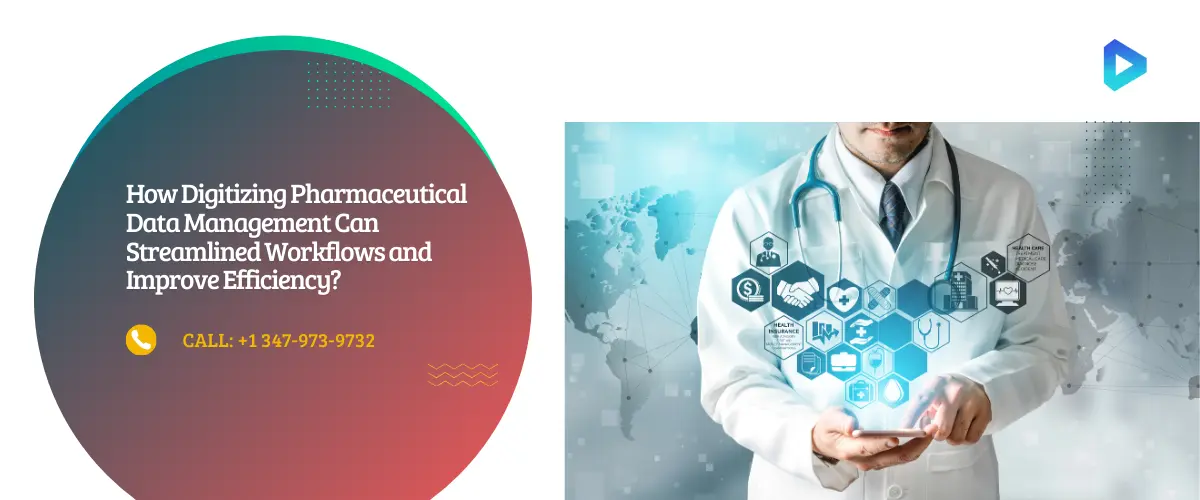
- Automation of medication ordering, inventory management, and dispensing processes
- Detection of adverse drug reactions and drug interactions
- Optimization of resource utilization and improved operational efficiency
1. Automation of medication ordering, inventory management, and dispensing processes:
Digitization and real-time information analytics enable the automation of various tasks in medicine management, leading to smoother workflows and increased efficiency. Automated systems can generate medication orders based totally on patient desires, tune stock stages, and cause automatic reordering while substances are low. Additionally, computerized shelling out machines can, as they should, dispense medications, decreasing the ability for human mistakes and ensuring patients obtain the proper medications at the right time.
2. Reduction of errors and waste:
By leveraging real-time data and automation, healthcare systems can significantly reduce medication errors and waste. Automated medication ordering and dispensing processes minimize the risk of transcription errors, ensuring that patients receive the correct medications and dosages. Furthermore, data analytics can help identify trends and patterns in medication usage, enabling better inventory management and reducing the likelihood of medications expiring before use. This reduction in errors and waste not only improves patient safety but also leads to cost savings for healthcare organizations.
3. Optimization of resource utilization and improved operational efficiency:
Real-time data analytics enables healthcare administrators to gain insight into resource use and identify areas where they can optimize efficiency. By analyzing data on patient flow, staffing patterns, and equipment usage, healthcare facilities can make data-driven decisions to allocate resources effectively. This optimization of resources leads to improved working efficiency, shorter wait times for patients, and better overall patient satisfaction.
Enhanced Patient Care and Outcomes
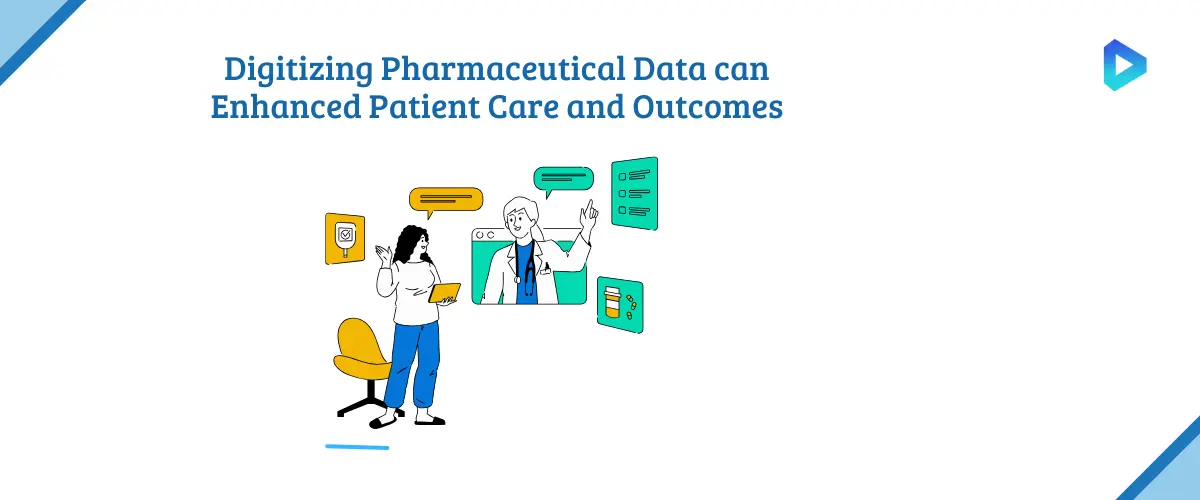
- Personalized and proactive care delivery
- Improved medication management and treatment plans
- Empowerment of patients through access to digital health records
1. Personalized and proactive care delivery:
Digitization and real-time data analytics enable healthcare vendors to supply customized and proactive care to patients. By integrating information from diverse assets, which includes digital health statistics, wearables, and affected person-pronounced facts, healthcare professionals gain a comprehensive understanding of each affected person's health popularity and threat factors. This lets them tailor treatment plans based totally on character wishes, options, and clinical histories.
2. Improved medication management and treatment plans:
The digitization of healthcare records and real-time analytics greatly complement medication management and treatment-making plans. With access to up-to-date information about affected persons, healthcare providers can make more informed selections about medication choices, dosages, and ability interactions. Automated structures can generate remedy alerts, making sure that healthcare specialists are privy to any potential troubles or limitations before prescribing or giving pills.
3. Empowerment of patients through access to digital health records:
Digitization empowers patients by granting them access to their digital health records and real-time health data. Patient portals and mobile health applications allow individuals to view their lab results, appointments, and treatment plans, fostering a sense of involvement and responsibility in their healthcare journey. This transparency encourages patients to actively engage in their own health management, leading to better adherence to treatment plans and healthier lifestyle choices.
Regulatory Compliance and Data Security
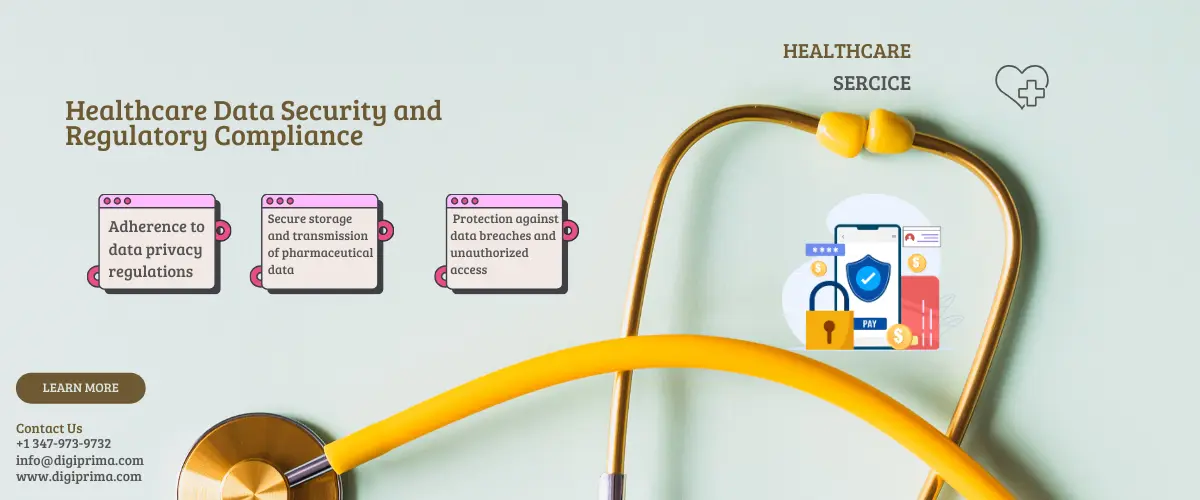
- Adherence to data privacy regulations
- Secure storage and transmission of pharmaceutical data
- Protection against data breaches and unauthorized access
1. Adherence to data privacy regulations:
Digitization involves the storage and exchange of touchy-affected persons and pharmaceutical records, making it vital for healthcare businesses and pharmaceutical groups to conform to statistics privacy guidelines. Laws like the Health Insurance Mobility and Accountability Act (HIPAA) and the General Data Protection Regulation (GDPR) set strict recommendations for safeguarding patient statistics and personal statistics.
2. Secure storage and transmission of pharmaceutical data:
As pharmaceutical facts become digitized, secure garage and transmission mechanisms emerge as paramount. Digital statistics on drug manufacturing processes, medical trials, and pharmaceutical research are valuable and must be protected from unauthorized access or manipulation. Employing robust encryption and stable cloud garage solutions enables safeguarding this fact throughout its lifecycle, from research and improvement to distribution and patient use.
3. Protection against data breaches and unauthorized access:
Healthcare organizations and pharmaceutical companies hold a vast amount of sensitive data that can be enticing to cybercriminals. The digitalization of this data necessitates robust cyber security measures to protect against data breaches and unauthorized access. Implementing firewalls, intrusion detection systems, access controls, and regular security audits helps fortify digital systems and prevent unauthorized individuals from gaining access to critical information.
Facilitating Research and Innovation
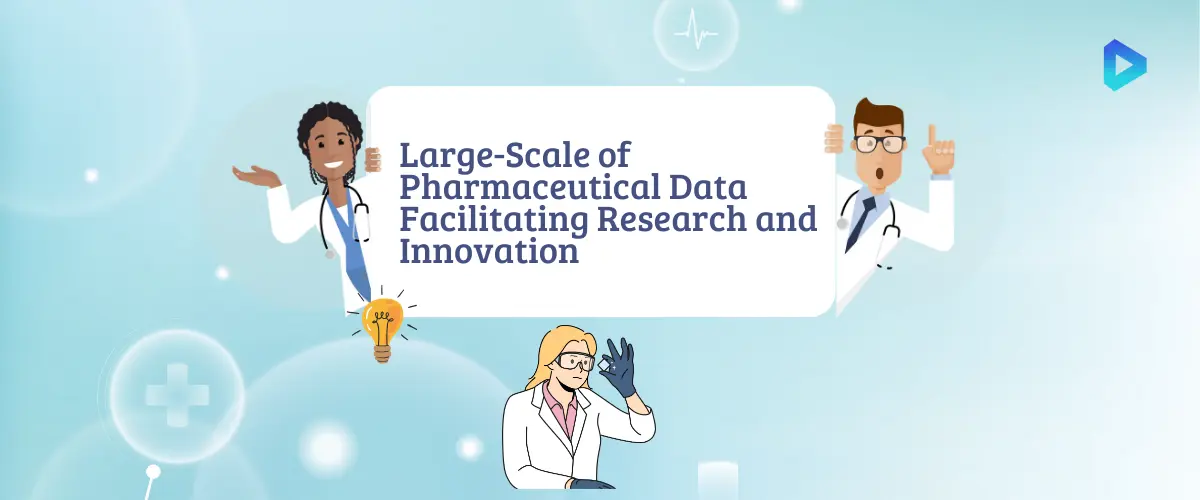
- Access to large-scale data for research purposes
- Acceleration of drug discovery and developmen
- Advancements in precision medicine and personalized therapies
1. Access to large-scale data for research purposes:
Digitization enables the collection and storage of giant quantities of healthcare and pharmaceutical statistics, which include electronic health facts, genomic data, and real-time patient records. Researchers can get entry to this rich pool of records for diverse research, health-related studies, and medical trials. Analyzing massive-scale records permits researchers to pick out styles, trends, and ability correlations that could lead to groundbreaking discoveries and advancements in clinical technological know-how.
2. Acceleration of drug discovery and development:
Digital tools and data analytics expedite the drug discovery and development method. By making use of computer modeling and simulation, researchers can test the capability of drug applicants genuinely earlier than accomplishing expensive and time-consuming laboratory experiments. Real-time record analytics is a resource for figuring out target molecules, predicting drug interactions, and assessing drug efficacy, streamlining the drug improvement pipeline.
3. Advancements in precision medicine and personalized therapies:
Digitization plays a critical role in advancing precision medicine and personalized therapies. By integrating genomic data, electronic health records, and real-time patient data, healthcare providers can identify genetic factors influencing disease weakness and drug responses. This knowledge enables the design of targeted and individualized treatment plans tailored to a patient's unique genetic makeup. Precision medicine holds the promise of more effective treatments with fewer side effects, transforming the approach to patient care, and enhancing treatment outcomes.
Challenges and Consideration
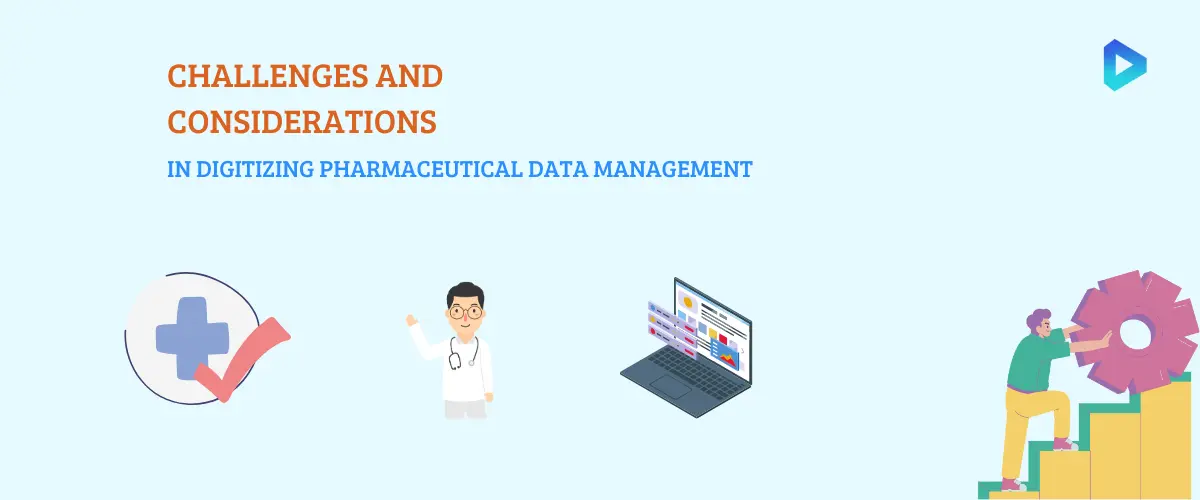
- Examples of healthcare organizations benefiting from digitizing pharmaceutical data
- Positive outcomes and lessons learned
1. Examples of healthcare organizations benefiting from digitizing pharmaceutical data:
- Mount Sinai Health System: Mount Sinai, a prominent healthcare system in the United States, embarked on a comprehensive digitization initiative to improve patient care and research outcomes. By digitizing pharmaceutical data, Mount Sinai streamlined medication management and electronic prescribing processes. This not only reduced medication errors but also improved medication adherence and patient safety. Additionally, the digitalization of pharmaceutical data assisted data-driven research initiatives, enabling Mount Sinai researchers to identify novel drug targets and conduct advanced studies in precision medicine.
- University Hospitals Birmingham NHS Foundation Trust: In the United Kingdom, the University Hospitals Birmingham (UHB) NHS Foundation Trust adopted digitization to enhance patient care and working efficiency. By digitizing pharmaceutical data, UHB improved medication management and inventory control, leading to cost savings and reduced waste. The digital system provided real-time medication information, ensuring patients received the right medications promptly. This digitalization effort significantly reduced medication-related errors and improved patient outcomes.
2. Positive outcomes and lessons learned:
- Increased patient safety and better outcomes: Digitizing drug data shows improvement in patient safety by reducing medication errors, adverse drug events, and treatment delays. The streamlined medication management process ensures patients receive appropriate and timely treatments, leading to better health outcomes and increased patient satisfaction.
- Improved operational efficiency: Digitization optimizes medication inventory management, reduces administrative tasks, and enhances workflow efficiency. This allows healthcare professionals to allocate more time to patient care, improving overall healthcare service delivery.
- Data-driven research and innovation: Healthcare organizations that digitize pharmaceutical data gain access to a wealth of information that can fuel research and innovation. Real-time data analytics aids researchers in identifying new drug candidates, predicting treatment responses, and advancing precision medicine initiatives. This leads to groundbreaking discoveries and the development of more effective therapies for various medical conditions.
- Data security and privacy considerations: As healthcare organizations digitize pharmaceutical data, they must prioritize data security and privacy. Implementing robust cyber security measures and adhering to data protection regulations is essential to safeguarding patient information and maintaining the trust of both patients and stakeholders.
Conclusion
- Recap of the importance of digitizing pharmaceutical data
- Future trends and opportunities in the digitization of healthcare
1. Recap of the importance of digitizing pharmaceutical data:
Digitizing pharmaceutical data holds immense importance in transforming the healthcare and pharmaceutical industries. It streamlines medicine management, reduces mistakes, and improves affected person protection. Real-time information analytics enables records-driven decision-making, leading to higher affected person outcomes and customized remedy plans. By digitizing pharmaceutical statistics, healthcare agencies can accelerate drug discovery, improve precision medicine initiatives, and drive innovative studies.
2. Future trends and opportunities in the digitization of healthcare:
Looking ahead, the digitization of healthcare is poised to witness similar improvements and game-changing trends. One of the emerging trends is the mixing of synthetic intelligence (AI) and machines getting to know virtual healthcare structures. AI-pushed gear can analyze tremendous datasets to perceive styles, predict disease progression, and recommend personalized treatment alternatives, improving precision remedy efforts. Additionally, the boom of faraway patient monitoring and telehealth offerings will permit more access to healthcare for sufferers in remote regions and improve care coordination.

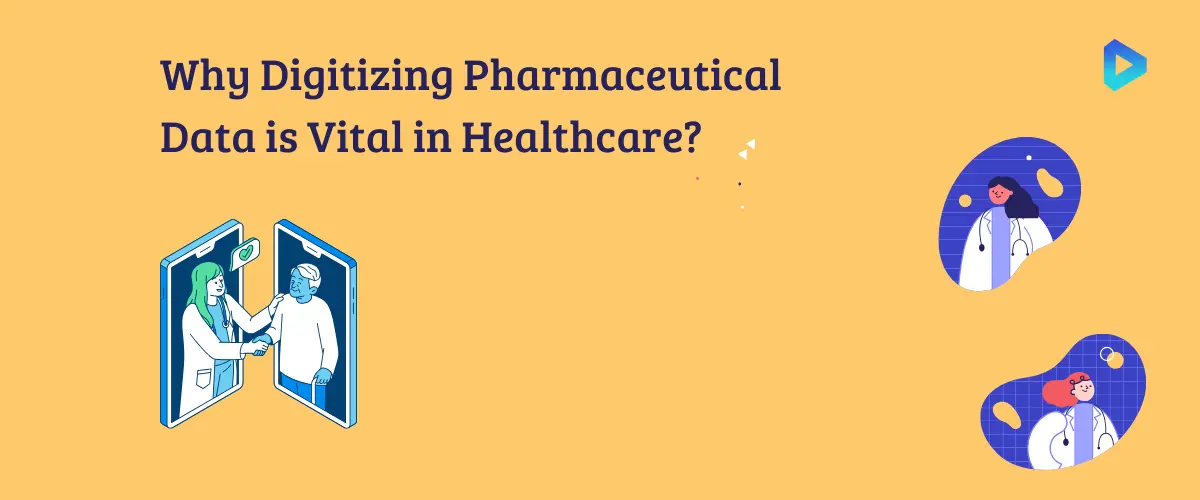

Fill Your Requirements
Contact Info
Call Us 24/7 For Business Inquiry
[email protected]
[email protected]
+91 9039928143
Career Inquiry
[email protected]